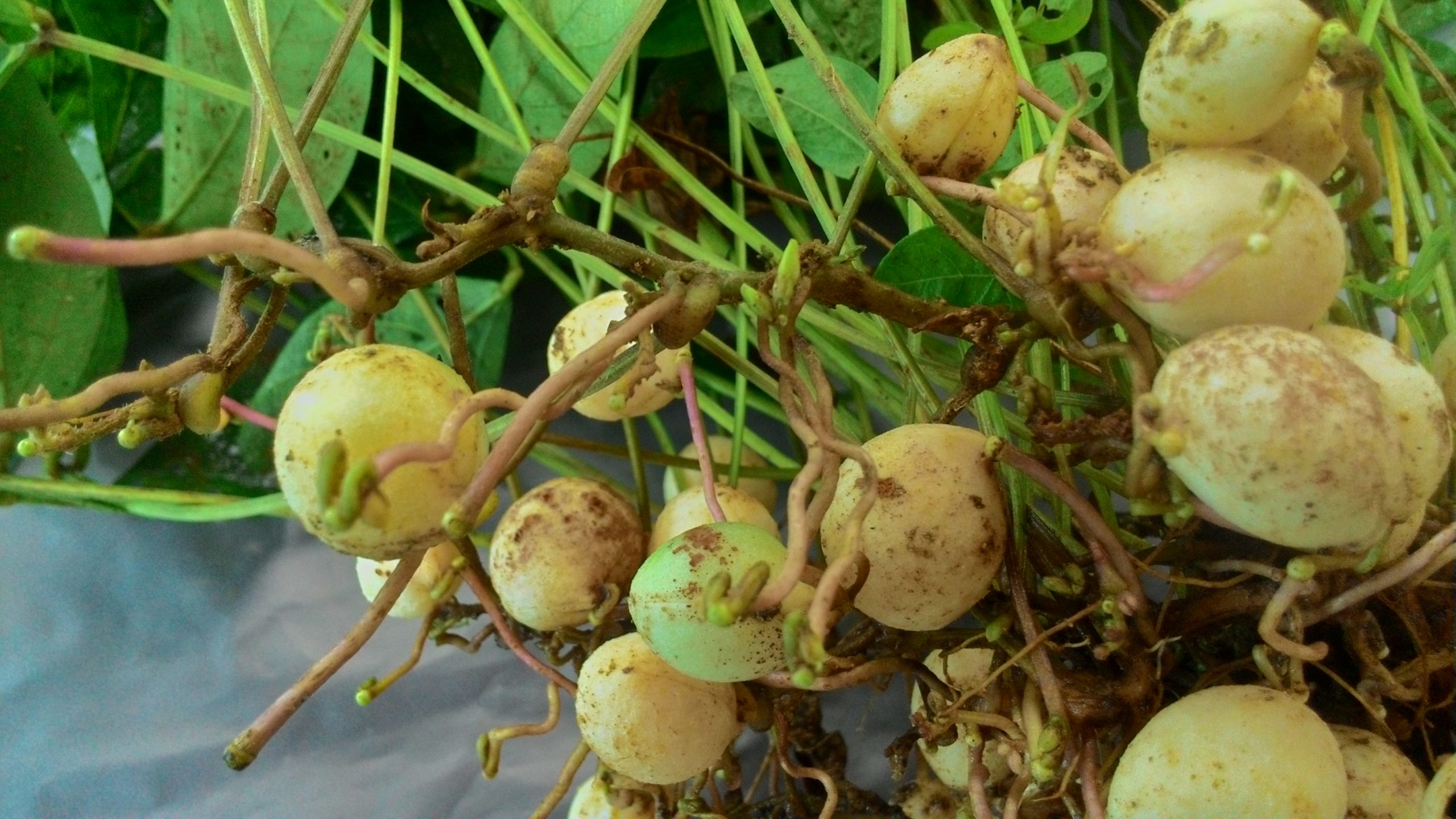
November 9, 2021, by Lexi Earl
Supporting small scale farmers in developing countries
Diversifying agriculture away from limited cereal crops is important for surviving and building resilience to climate change. It also enables small scale farmers to build socio-economic flexibility, and food and nutritional security, argue Sean Mayes and Festo Massawe.
Our current reliance on three major cereal crops for 60% of plant-based calories worldwide is risky. Climate change leads to extreme weather events and changes historical rainfall patterns, thus affecting crop yields and harvests. The most effected people are poor, rural, small scale farmers in developing countries, where major staple crop failure can have serious consequences. Many such farmers grow traditional crops, in addition to staple crops, as part of a way to secure family food supplies. Many of these ‘home garden’ crops have been maintained and selected by farmers for millennia, and were only relatively recently partially displaced by the newer major staple crops. Such crops often retain resilient traits (like drought tolerance) and may provide yields even when staple crops have failed. However, these traditional/home garden crops have received far less research attention than their mainstream counterparts.
We are working with in-country research agencies in South Africa and Ghana, and with farmers to develop improved genotypes for Bambara groundnut (Vigna subterranea) using research that stretches from genomics to socio-economics. The research uses DNA fingerprinting technology and screening tools, and we develop new varieties with enhanced drought tolerance and nutritional quality. By collecting seeds from the full geographic range of a species and developing characterised collections for both DNA and traits, we can provide pre-breeding and field selection collections that can be tested in any relevant environment.

Variation in pod set of Bambara genotypes
Plants are grown under controlled conditions and in field trials with participating farmers in order to breed new material for certification by the country’s crop authorities. In the next two years we hope to have registered new Bambara groundnut varieties in South Africa and Ghana, as part of providing better quality growing material for small scale farmers and consumers that are drought tolerant, easier to cook and rich in nutrients. We also aim to develop a range of resources for other researchers, breeders and farmers worldwide in climate-tolerant minor or underutilised crops. This will help breeders to develop and farmers grow more tolerant crops that simultaneously require fewer resources, and will help diversify agricultural practices away from the three main cereal crops, thus also contributing to diet diversification.

Bambara intercropped with maize
Working directly with small scale farmers is crucial to the success of this research. Participatory plant breeding ensures that the new crop varieties are acceptable to end users (farmers, their families, local consumers). A major shift in policy is needed to support the diversification of agriculture as a climate change adaptation and mitigation strategy. Diversifying agricultural practices, particularly in marginal or stressed environments, will help build agricultural resilience in the face of climate change, and contribute to food and nutritional security where it is needed most. Supportive policies should include funding for research and development, and provide structural support to make diverse ranges of food crops available and accessible to people. It is essential that the variety registration regulatory system for plant breeders is changed. It is currently rigid and often expensive, limiting breeding interests to major crops. Currently, formal seed systems are also concentrated into commercial companies, making it difficult for small-scale operations and informal seed systems to provide alternatives.
Further reading:
Plants for future food security: the case of Bambara groundnut (2020) Future Food bloghttps://blogs.nottingham.ac.uk/futurefood/2020/03/23/plants-for-future-food-security-the-case-of-bambara-groundnut/
Tan Xin Lin (2021) Bambara groundnut for food and nutritional security Future Food bloghttps://blogs.nottingham.ac.uk/futurefood/2021/08/11/bambara-groundnut-for-food-and-nutritional-security/
The clever roots of Bambara groundnut: an interview with Kumbirai Ivyne Mateva (2021) Future Food blog https://blogs.nottingham.ac.uk/futurefood/2021/08/16/the-clever-roots-of-bambara-groundnut/
Sean Mayes is an Associate Professor in Crop Genetics and has worked extensively on both major and minor crops. From 2011-2020 he was involved in the Crops for the Future Research Centre project in Malaysia, leading the Research Themes for crop genetic diversity and field evaluation. Jointly with UNMC and with partners worldwide, he has researched a range of underutilised crops with stress tolerance traits and has helped to develop and assess collections of germplasm for Bambara groundnut, winged bean, foxtail millet, proso millet, leafy amaranth and moth bean. He strongly believes in ‘context appropriate’ agriculture, fitting the system to the environment for sustainable production of nutritional food. Diversification is a key part of future agriculture, especially where resources are limited and environments hostile.
Festo Massawe is a Professor of Crop Science based at the University of Nottingham Malaysia. His research is focused on improving productivity, quality and value of food crops especially of minor and underutilized species. He strongly believes crop diversification is one way of building a sustainable and resilient food system to tackle food security and nutrition, adapt to climate change and to safeguard our planet for future generations. He is currently researching Bambara groundnut, winged bean, amaranth and oil palm, working closely with partners in Africa, Asia and Europe. He is also interested in food environments in transitioning economies and how these could be shaped to deliver sustainable and healthy diets.
Follow Festo @festounmc on Twitter.
No comments yet, fill out a comment to be the first

Leave a Reply